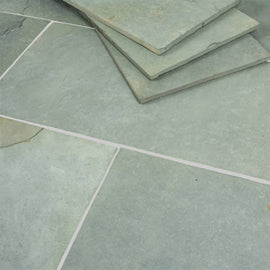Sort + Filter
Slate Tiles
Slate tiles are one of the best-known types of natural stone surface tile choices. They have been used since ancient times, especially for roofing. They are not susceptible to chips, fractures, scratches, or cracks. Although periodic sealing is required, it's a great alternative for bathrooms, kitchens, and commercial areas. Slate tiles are becoming an increasingly popular option for flooring, too. Learn More
£24.00
£57.59
£42.00
£34.50
£37.50
How Is Slate Tiles Flooring Unique?
Slate differs from other floor coverings and natural stone flooring options in its distinctive visual look. Slate can be discovered and produced worldwide, and the mineral makeup of the environment in which it was formed will affect how it looks. Its colour ranges from black to dark grey to vibrant and vivid hues. The natural slate's rough, chipped surface also offers a desired rustic appearance. If you choose honed or polished slate, which is homogeneous in colour, you may still have the durability and resistance of slate in a neater look; however, if you don't want the distinctive look of slate or maybe if your interior visual style is more simple and sleek than rustic.
We have tiles in other materials, too. Do check
Benefits Of Choosing Slate Tiles:
Makes An Economic Choice
Slate is still the least expensive natural stone flooring type and far less costly than marble or granite surfaces.
It Makes A Moisture Resistant Choice
Slate is a highly water-resistant stone, making it suitable for use in areas likely to see a lot of moisture interaction, such as bathrooms, kitchens, and utility rooms. Even the walls of your bathroom can be given slate tiling.
Slate Suit Both Indoor And Outdoor Settings
Slate floor tile may be used for both interior and exterior settings. It is a beautiful choice for sidewalks and landscape stepping stones because it is durable and moisture-resistant.
Slate Floors Are Safer Than Rugs
Slate is an excellent flooring option for those who battle allergic reactions because it is simple to maintain and, unlike rugs, won't trap dangerous pollen.
Slate Fire Hearths Are The Best
Slate is undoubtedly the ideal material to choose when building an enduring fire mantle for your home. Not only is it fireproof, but it also raises the value of your house.
Your Slate Floor Is Resistant To Wear
Although it is common knowledge that damaged tiles may be easily replaced, they can still be a nuisance that could be avoided. It makes sense to install more resilient tiles, which is crucial in high-traffic areas like a kitchen or living room. In this atmosphere, slate floor tiles gleam. Even in high-traffic areas, slate tiles reasonably withstand normal wear and tear.
Slate Tiles Wall:
Slate tiles require less upkeep. They are inherently water-resistant and straightforward to clean. Sealing the tiles can improve their stain and water resistance, making them acceptable for kitchens, baths, and outside walls.
Slate Tiles Kitchen:
Slate is an excellent choice for kitchen flooring since it is one of the most robust flooring materials and, when properly maintained, will retain its exquisite, natural appearance for many years.
Slate Tiles Bathroom:
They are ideal for bathroom design, kitchens and high-traffic areas because of their resistance to damage. The impermeable quality of slate guarantees that it is not impacted by moisture and, as a result, has intrinsic anti-slip characteristics. Slate paving is thus an ideal alternative for wet-prone outdoor settings. Although slate flooring is as durable as a rock, it requires regular upkeep to keep it looking its best. You can use various standard cleaners and instruments on slate, but you should never use others. When it comes to stains, a household agent is generally sufficient.
Finishes Of Slate Tiles:
Slate is commonly available in three different finishes: riven finish slate, brushed slate tile, and honed finish slate.
Check more detail about Slate finishes here.
Slate Style And Patterns:
We at Work Tops have different slate patterns to suit your needs. Here is a list of designs we sell
-
Multicolour tiles
-
Black riven
-
Grey riven
-
Hexagon shaped ties
-
Herringbone-shaped slate tiles
-
Mosaic multicolour tiles
-
Standard square-shaped tiles
-
Veined pattern tiles
Slate Tiles Maintenance:
Slate flooring requires very little care. All that is essential to maintain it nice and tidy is routine sweeping. The slate floor has a rough texture and a variety of colours, making it a very tolerant carpeting surface. Because of its distinctive design, slate helps to conceal dirt and deterioration quite effectively, so even if it gets flaky or accumulates filth, it will be barely noticeable.
Contact Us For UK Tiles Supply:
Call 033301135868 or send your tile enquiry to info@work-tops.com.
**We deliver tiles but please note that we do not offer tile installation services.








